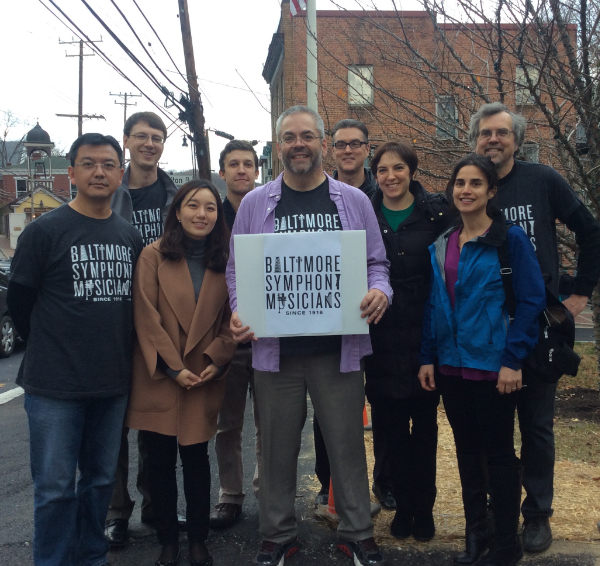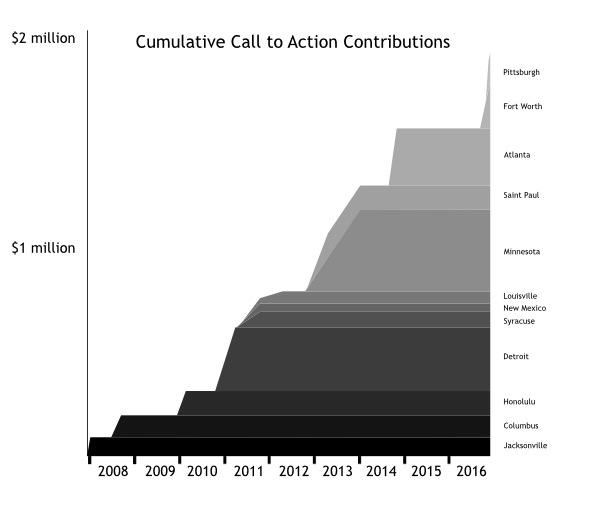Indianapolis Builds Momentum
The Musicians of the Indianapolis Symphony have ratified a new three-year contract. The new agreement, reached over a year in advance of the current deal’s expiration, runs through the 2019-2020 season. After suffering through a lock out in 2012 and two recent concessionary contracts, the musicians will see their annual salary increase 9.3% over the three years, reaching $76,500 in the final year. Other gains include the addition of two full time players, bringing the orchestra size to 76 members, an added week of paid vacation, and a $1000 bonus to each member of the orchestra. Greater restrictions to scheduling were also adopted in efforts to provide greater work relief for all players and to maximize occurrences of work weeks containing consecutive days off.
Due to the rising cost of health care, ISO management insisted on an increased cost share structure for one portion of the musicians’ health insurance benefit. In the final two years of the contract, musicians will see greater liability on the PPO insurance option, with an increase of 2% to the cost share in year two and an additional 3% in year three. Costs for the HDHP or high deductible option will remain the same as the previous contract for musicians enrolled. Pension and 403(b) retirement benefits remain the same for this contract.
The new contract agreement comes on the heels of three consecutive years of balanced budgets and dramatic increases in both ticket sales and fundraising. The ISO also received a very generous $10 million grant from the Lilly Foundation in late 2015. Funds from the gift were used to fulfill ISO pension obligations and to purchase essential equipment and infrastructure items for a new strategic digital media project to be launched in 2017. These positive institutional achievements and continued artistic excellence have set the stage for a unique opportunity for the orchestra to seize momentum and forge a mutually beneficial contract to propel the ISO forward.
Atlanta Surpassing Expectations
The Atlanta Symphony Orchestra reported extraordinary success in fundraising for its $25 million Musicians’ Endowment Fund, raising more than the nominal goal and doing so almost two years before the scheduled end date. The Fund was created as part of the settlement to the contentious lockout in 2014, with the purpose of restoring 11 positions to the orchestra by 2018. The ASO also reported that, of the nine musicians who joined the orchestra over the past year, six did so as a result of the Fund.
This achievement would not have been possible without the support from the Atlanta Symphony Orchestra family and the Atlanta community, represented by 13 major corporations, foundations, and two anonymous gifts. To recognize the generous capstone gift (of $2.5 million) from the Delta Air Lines Foundation, the Principal Tuba chair (currently held by ICSOM Treasurer Michael Moore) will be endowed and named the Delta Air Lines Chair.
“This is a major accomplishment for the ASO—a critical and foundational step. We have much more work to do toward re-establishing the stability and vibrancy of our Orchestra, but what a great moment to celebrate what has so quickly been accomplished. And to thank the many parties who have been so generous—not only with their money, but also time, passion and commitment,” said ASO Music Director Robert Spano.
Baltimore Engagement Past and Present
When the Baltimore Symphony celebrated its 75th anniversary back in 1991, many young concertgoers received souvenir pennants accompanied by a coupon for a free concert ticket redeemable during the BSO’s centennial year. In 2016, the Baltimore Symphony turned 100 and several local residents came forward and claimed their free concert tickets as promised to them 25 years ago. The slogan, “Today’s youth—tomorrow’s audience” was part of the 75th anniversary youth concert promotion.

Photo credit: Michael Lisicky
Towards the end of the BSO’s centennial year, four chamber ensembles comprising 12 Baltimore Symphony musicians performed throughout Ellicott City, Maryland, on November 26, as part of Small Business Saturday. On July 30 of this year, a storm dropped as much as six inches of rain in a brief period, causing a flash flood that ravaged Ellicott City’s historic district. The nearby Patapsco River rose 14 feet in an hour and a half, cars and people were washed away, and two people were killed. Several buildings in the downtown area were completely destroyed, and over 40 storefronts and restaurants were damaged or destroyed. After working closely with county officials, Baltimore Symphony musicians performed for four hours at the “grand reopening” of Main Street and around the businesses that were fortunate enough to rebuild and reopen in time for the important holiday retail season.

Baltimore Symphony Musicians Bo Li, Kevin Smith, Angela Lee, Schuyler Jackson, Michael Lisicky, Phil Munds, Lisa Steltenpohl, Katherine Needleman, and Jonathan Jensen in Ellicott City
Photo credit: Photo Courtesy of Michael Lisicky
National Symphony Orchestra Settles
The musicians of the National Symphony Orchestra ratified a new Collective Bargaining Agreement that is effective through September 2, 2019, retroactive to September 6, 2016. Agreement was only reached after a “play and talk” period lasting six weeks.
While initial management proposals included pay cuts without any restoration, the three-year deal provides for annual raises of 1%, 1.75%, and 2.25%. It also continues a system of annual caps on how large an increase in health insurance premiums the employer is required to absorb. Among other work rule changes, there is a significant reform to the tenure review process, which will now be one year in duration and feature more musician involvement. This involvement includes a binding vote by the tenure committee that must be favorable—along with the Music Director’s approval—for tenure to be granted.
The negotiations included a determined effort on the part of the management to reduce pay and benefits for substitute musicians, as well as pay for extra musicians, and bring them out of parity with regular scale. This effort was strongly resisted and ultimately rejected, preserving that parity.
Over the course of these negotiations, the Kennedy Center and its affiliate the Washington National Opera were also bargaining with several different unions, including AGMA (Washington Opera Chorus) and IATSE (wardrobe, makeup, box office staff, and stagehands). The mutual support of all the unions in the Center was evidenced by the black wristbands worn by NSO members, stagehands, and members of the Kennedy Center Opera House Orchestra.
Only 10 days after the ratification, NSO Executive Director Rita Shapiro announced her resignation. No replacement has yet been announced. Her 15-year tenure was marked by the hiring of two new music directors; tours to Asia, South America and Europe; and the American residency program.
Detroit Continues Acceleration
At its Annual Meeting of Governing Members on December 8, the Detroit Symphony Orchestra announced that it had achieved an operating surplus for the fourth consecutive year. Annual operating contributions exceeded budgeted expectations by more than $1 million. Additionally, the 2015-16 season saw the fifth consecutive year of increases in the dollar amounts of individual giving and revenues from subscriptions, as well as the number of subscriptions sold. There was also an increase in total ticket revenue. Jeremy Epp, DSO Orchestra Committee Member and Musician Representative on the Board of Directors, said, “As we innovate and evolve as an organization, our commitment to our core vision—to provide Detroit with an orchestra worthy of a world-class city—remains steadfast.”
The orchestra also announced its first international tour in 16 years. The tour, featuring 11 concerts in Japan and China conducted by Music Director Leonard Slatkin, will take place in July 2017. It will begin with a free “send-off” concert in Detroit “to say thank you to its supporters and fans in the Detroit community,” according to a press release.
More Recovery in Minnesota
The Minnesota Orchestra has traveled a long road from the depths of the 16-month lockout that ended in 2014. On December 2, it announced continued progress along that same path. The 2015-16 season was the second consecutive year of a balanced budget. Even though total tickets offered for sale increased by 4% over the previous year, total tickets sold increased by 9%, causing an increase in the average sold capacity, to 87%. The number of subscribers also increased by 12%. Total earned income, which includes food and beverage sales and rental income from the renovated Orchestra Hall, increased by nearly 13% compared to the previous season.
The orchestra also reported that community donors—defined as those who give up to $2,500 per year—increased by 1,000 people, with the total number of donors of all types rising to 7,200. “We are heartened to see this solid and growing base of support,” said Kevin Smith, President and CEO.
The orchestra also announced the election of new Board Chair Marilyn Carlson Nelson, who (along with her late husband Glenn Nelson) funded the orchestra’s historic 2015 tour to Cuba (reported in the July, 2015, Senza Sordino) and the January, 2016, Beethoven Marathon (a two-week span during which the orchestra performed all nine symphonies and five piano concerti). “This Orchestra is in the midst of a truly exceptional period of artistic growth and collaboration,” said Herbert Winslow, MO Musicians’ Committee Chair. “With one of Minnesota’s most respected and revered business leaders stepping up to lead our board, we’re expecting even greater days ahead.”
Ruth Bader Ginsburg, Duchess of Krakenthorp
Election? What election? November in Washington, DC, marked Supreme Court Justice Ruth Bader Ginsburg’s debut with the Washington National Opera. On opening night of The Daughter of the Regiment, Justice Ginsburg played the Duchess of Krakenthorp. A non-singing role, the Duchess is the proud, albeit comically foolish aunt of the man whom the opera’s protagonist doesn’t love but almost marries. Act II begins with remarks (in English) from the Duchess to her hopeful niece-in-law, detailing the rules for holding the position of rank to which she is poised to rise. The original lines had been modified in consultation with Justice Ginsburg, and there were many political references. “Dropping traditions that have worked and continue to work is like throwing away your umbrella in a rainstorm because you are not getting wet,” for example, is an adaptation from a well-known line from Ginsburg’s dissent in the Supreme Court’s 2013 decision that weakened parts of the Voting Rights Act. In the week preceding this one-night-only performance, when asked if she was getting nervous, she replied, “What’s to be nervous about?” The audience rose to their feet several times throughout the evening for Justice Ginsburg, who is an opera aficionada and long-time Washington National Opera patron.

Since the first ICSOM Call to Action in 2007, the collective action of ICSOM musicians—together with our brothers and sisters in other Players’ Conferences and AFM Locals—has raised more than $1,930,000 in support of their beleaguered fellow musicians. This amazing outpouring of solidarity made manifest has enabled more than one orchestra to step back from crisis and return to financial success that matches their artistic success. Indeed, three of the 11 ICSOM orchestras for whom CTAs have been issued are featured in this issue’s newslets with reports of excellent financial results.





